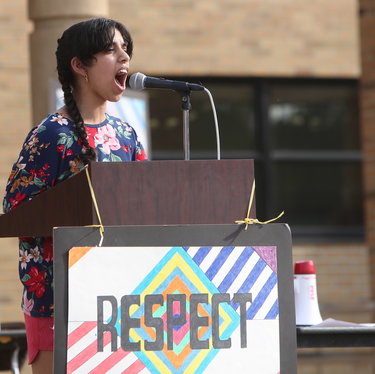Ten vie for four seats on Guilderland School Board
GUILDERLAND — The Guilderland School Board election is hotly contested with 10 candidates running for four seats. Voters go to the polls on May 17, when they will also decide on the district’s $110 million budget for next year.
For the first time in years, some candidates are running as part of a slate. Two slates of four have formed and there are two candidates running independently.
One slate was formed through a Facebook group called “Taking back our school boards” as part of the national Pro-parent Choice movement that started with parents objecting to their children having to wear masks in school.
“We need one more hero in the Guilderland school district to run for school board. This will give us a full slate of pro parent choice candidates,” wrote Jeff Thomas on March 14 to the “Taking back our school boards” Facebook group. “Please consider running. We will assist you 100%. We will march together to victory in May … Our beautiful children need you.” He also wrote, “God is moving in our group!”
Thomas, a local developer, was part of a large and sometimes hostile group that attended a Guilderland School Board meeting in August to oppose requiring children to wear masks in school. In September, Thomas was a driving force as he and four other parents filed a federal lawsuit to stop the state’s mask mandate in schools.
The Pro-parent Choice slate is made up of the school board’s longest-serving member, Barbara Fraterrigo, seeking a ninth term, along with three candidates making their first run for the board: Nicole Coonradt, Mark Reamer, and April McAllister.
A second slate is made up of three current school board members — Gloria Towle-Hilt, the board’s vice president, running for a sixth term; Kelly Person, seeking a second term; and Kimberly Blasiak, who was chosen among six applicants to fill a vacancy in October — as well as Katie DiPierro, a teacher.
The two independent candidates are Jennifer Romano and William Kearney, each making their first run for the board.
The nine-member Guilderland School Board typically has three three-year posts up for election each year. This year, in addition to the seats held by Fraterrigo, Person, and Towle-Hilt, the seat to which Blasiak was appointed will be up for election.
The top three vote-getters will serve three-year terms, and the candidate who comes in fourth will serve a one-year term. The posts are unpaid.
Five of the candidates attended an in-person forum on April 20 in McKownville, during which some audience members asked questions that pointed up differences among the candidates.
All ten candidates then participated in an online forum hosted by The Enterprise. The candidates were each asked three issues-based questions, itemized below. Their closing statements were largely harmonious.
“What I’ve learned tonight,” said Reamer, “is, despite … some difference, we have a lot more common ground between us than anything.” He said that, in the hour of listening to others’ views, his positions were changing — “and that’s what should happen,” he said.
McKownville forum
About 50 people attended the McKownville Improvement Association meeting where, between an engineer’s presentation on a stormwater system and a resident’s talk on tree planting, five of the school board candidates introduced themselves and then answered questions.
Each of the candidates — Blasiak, DiPierro, Romano, Coonradt, and Fraterrigo — said she supported the proposed budget and each said her campaign was being self-supported, not financed by any outside group.
A man in the McKownville audience asked what the candidates thought about critical race theory. CRT looks at the way society, race, and law intersect in the United States and is largely taught in law schools or at the graduate level.
It is not part of the public school curriculum in New York State.
However, during the 2020 presidential election, Donald Trump adopted opposition to CRT as a campaign theme and issued an executive order to cancel funding for government programs that mentioned “critical race theory” or “white privilege” because it constituted “divisive, un-American propaganda” and was “racist.” Trump formed a 1776 Commission to promote “patriotic education.”
Joe Biden, right after he took office, rescinded Trump’s order and dissolved the 1776 Commission.
“I don’t want [students] taught their race defines who they are as a person,” said Coonradt, answering the McKownville man’s question.
“I’m definitely not for critical race theory,” said Blasiak, noting it’s taught at the university level. She also said there’s “been a lot of confusion” because the Regents guidance for New York State schools is to promote culturally responsive teaching, which has the same initials — CRT.
Blasiak said that school board members don’t set curriculum. “We want to make sure every single student in our classes feels safe and secure,” she said.
Fraterrigo responded by saying that the underlying theme of CRT is “that white people are oppressors.”
“That’s not CRT,” interjected Blasiak.
Fraterrigo went on to note that the district for the first time this year has a director of diversity, equity, and inclusion. “Some of the things do sort of sneak in the back door,” she said. “The kids have asked teachers to wear a badge they’re not racist … I personally have a problem with that.”
Fraterrigo said that could make people perceive of teachers not wearing a badge as racist.
Blasiak told Fraterrigo that the badges are not about racism. “It’s for LGBT,” she said, giving students who are lesbian, gay, bisexual, or transgender “a soft spot to land,” someone they can feel safe talking to.
Superintendent Marie Wiles told The Enterprise this week that, after Guilderland High School students hosted an anti-hate rally in June, they offered buttons to put on lanyards or stickers for windows that teachers could sign up for as a symbol to say, “I’m here for you if you want to talk about anything.” Wiles added, “It’s all voluntary.”
Romano at the McKownville forum chimed in that individuals who have been marginalized are at a higher risk of suicide and violence. She said her “safety first” platform includes feeling safe in your own skin.
Another audience member told the Pro-parents Choice candidates she had seen negative and hurtful comments on their website that didn’t square with what she was now hearing about equity and everyone feeling safe.
Referring to posts about training teachers to be respectful of LGBT kids, she said, “The comments are incredibly negative, hurtful, terrible, really honestly just shouldn’t come out of anyone’s mouth … That’s not what you’re saying here … It’s on the website that has your name on it,” she said.
“I can’t control what other people say,” said Coonradt, adding, “I hate social media.”
Coonradt also said, “I am someone that stands for pro-choice …. There are parents that feel they are not being heard …. I’m a parent who cares about kids.”
Blasiak referenced a training session for Guilderland faculty — on the use of pronouns — that commenters on the “Taking back our school boards” page had been critical of. “Makes us wonder what else is being indoctrinated into our children,” wrote April McAllister, who announced herself as a Guilderland School Board candidate on the same site.
“I take it personally because I have a transgender son,” said Blasiak to applause from the McKownville crowd. “He is a wonderful, unbelievable human being who actually wants to be a teacher someday.”
Wiles told The Enterprise this week that at a March 31 meeting, Guilderland faculty received training from the Gay, Lesbian & Straight Education Network, which she described as a “refresher” on training that had been ongoing for a decade. There was a section on vocabulary and a section on “strategies and resources to support that population,” said Wiles. “The pronoun piece was very small.”
“The bulk of it was how to provide support for LGBTQ+ students,” Wiles said and involved reviewing statistics on problems with attendance and graduation rates and the “tragically high rates of self-harm and suicide.”
The March 31 training happened to be scheduled on the same day as calling hours for a student, Megi Hamza, who had died in a car accident so teachers who were mourning their student asked the high school principal to make a video of the training, which he did.
The video was inadvertently posted to the district’s website. The district didn’t have permission from the presenters, Wiles said, and found out about the error from the “intense negative commentary on social media.”
“We were stunned,” she said, and the presenters were “terrified” with the reaction they got.
The training on pronouns was on having students self-identify — for example, using she/her or he/him — instead of assuming someone’s identity or which pronouns they use. This is meant to respect someone’s identity and create a more welcoming space for people of all genders.
At the April 12 school board meeting, Rachel Reilly, a Guilderland parent, criticized the school board president, Seema Rivera, for a social media post in which she wrote, “We’ve had some local people angry that the school has informed kids about pronouns and in their view that’s indoctrination. #BigotsTakeAHike.”
“Calling members of the community bigots because they may not share the same views is unkind, unfair, and close-minded,” said Reilly.
Reilly concluded her lengthy statement by telling Rivera, “If one cannot lead by example, one should not lead at all.”
Rivera responded, “Yes, I affirm the right for students to use pronouns and I affirm the right for kids who are asking for that respect.”
Fraterrigo, speaking in McKownville, described part of the March 31 session as asking teachers to have their students identify their pronouns. “I have a problem with that,” said Fraterrigo.
A student being asked to do that by a teacher could feel coercive, she said. “Students are running rampant because the teachers are afraid that, if they discipline or if they make a comment that they’re going to be called racist or homophobic,” said Fraterrigo. Students shouldn’t have to identify their sexuality, she said.
Romano told Fraterrigo, to applause, that sexuality would be who you partner with, which is different from gender identity. “It’s just having sensitivity to one another …,” said Romano, “and no one has to be in a dark place.”
Standardized tests
At Tuesday’s Enterprise forum, the candidates were asked where they fell on the spectrum of supporting “teaching to the test” to keep the district’s ranking high as opposed to allowing teachers more freedom in creating their own curricula or in serving students’ social and emotional needs.
Coonradt said, “Children learn indifferent ways,” with some being more hands-on. She also said that schools should stick to the academics and the “main subjects.”
“I feel like we kind of are putting a lot on our teachers and that we shouldn’t keep adding more,” Coonradt said.
Romano said that, as a student herself, she was not a good standardized test-taker and she didn’t realize she was intelligent until some of her high school teachers invested in her. She went on to graduate from Siena College in three years, earn an MBA, and have a successful career, she said.
“I have faith in our educators,” she said, to know what is best, and she said some teachers are leaving the field because “they don’t have autonomy to make decisions.”
Person said, “Unfortunately, we seem to base everything on testing and I don’t necessarily agree with it … I don’t believe standardized tests are necessarily equitable for all students.”
She advocated teaching “to the whole child” to create responsible citizens and lifelong learners.
Reamer said that, “whether you test well or not, doesn’t really measure your intelligence.”
When you get to college, he said, “You need to know the correct information in order to succeed there.” He concluded, “This district should be able to come up with a curriculum that prepares the students, but doesn’t just compare them according to their ability to test.”
Kearney said, “I actually believe in standardized testing. I am for them.” He moved to the district seven years ago, he said, after looking at school reports online to see how Guilderland was graded.
“I purposely chose to pay higher taxes in this school district to have my kids go to a school that emphasizes good grades and high education and graduation rates,” Kearney said. He advocated helping students who are not good at standardized tests.
Towle-Hilt said that standardized tests measure only one piece of a person. “The problem is, some people want to use just a score to make huge decisions about people’s lives or judge them or rate them in some way — and I find that atrocious.”
She said students should be looked at as a whole and more universities are doing that.
McAllister said that standardized tests “bring a great deal of stress on many children and parents and teachers. She suggested allowing students to opt out of tests. “I don’t think there’s enough information coming across [from] the board for these families to know they have options.”
She also said that testing is important to “measure a student and where they are and where they need to go, and I think that can help the teacher.”
DiPierro described a test as “a snapshot in time” and said, “There’s other ways for students to demonstrate their learning that’s individualized.”
Teachers are the experts in the classroom, she said, and can individualize and focus on students.
Fraterrigo said, “You have to have some form of standardized testing to establish a baseline of where your student process has gone to. On the other hand, it doesn’t damp down innovation in the classroom.”
She said Guilderland teachers have merged “their great innovation talents with the testing.” Everything in life centers around testing, Fraterrigo said, “so we can’t just ignore it.”
Blasiak specified that the local school board has no say in either the statewide exams that are taken in third through eighth grades nor in the Regents exams given in high school.
“That said, during COVID, I was very excited when they did forgo the Regents” because there is more to a student than a test score, she said. While her own four children were learning at home during the pandemic shutdown, Blasiak said, she saw what “amazing things” Guilderland teachers were doing.
DEI
Guilderland created a new post this year for a director of diversity, equity, and inclusion and also has a DEI committee addressing issues revolving around race, religion, sexual orientation, ethniciy, and more. Candidates were asked if this is a good use of district energies and resources and why or why not.
Romano said it’s important to have people feel safe in their own skin. “Offering professional development opportunities to open hearts and grow minds is critical …,” she said. “Respecting each other with empathy and compassion is a strength; it’s not a weakness.”
Romano said that confusing sexuality with gender identification is dangerous. “These youth are at a higher risk of bullying, family rejection, homelessness, self-harm, suicide, anxiety, and violence. We have to have these things in place.”
Person, who serves on the DEI Committee, called it “amazing” and called the DEI director “phenomenal.”
She said the committee is looking at the district “to see what things could change, what things are good, what things are bad, what things can support our children to be in a safe environment so they can be safe.”
Reamer said, “I’m just learning about this.” He studied up, he said, and agreed that DEI is necessary. “There’s a lot of reasons kids are bullied … We need to do everything we can to prevent that or stop it.”
However, Reamer said he didn’t agree with some of the ways “they’re going about it like [grades[] K through 3 talking about body parts.”
He concluded, “I think they should focus more with the kids that have these situations instead of jamming it down the throats of the kids who don’t have anything to do with it.”
Kearney said simply, “Yes, I do think it is a good way to spend our funds. And, when I’m on the board, I will make sure the proper allocation is put to this.”
Towle-Hilt said, “As a public school, we’re obligated to teach every kid that comes through our door … and kids come to us with various needs.”
She called both the DEI director and the committee “wonderful.” Towle-Hilt serves on the DEI Committee and is enthusiastic about an equity audit committee that will oversee an equity audit to “get a handle on where we are as a district.”
She cited the national motto, E pluribus unum. “Out of many, one. We only become one,” said Towle-Hilt, if we “come together and respect and honor our differences.”
McAllister said, “So DEI is new to me as well. …. I think there’s a time and place for it. I also think that we need to dig a little bit deeper and have more transparency on the programs and theories that are coming into the school districts that are being exposed to all children without parents knowing what’s going on.”
(All of the Guilderland DEI meetings are filmed with the videos posted on the district website.)
McAllister also said she had concerns about money being spent on DEI while other needs “just keep getting pushed to the back burner.
“I don’t think there’s anything wrong with classroom diversity and inclusion, but I think there’s a hyper focus on it right now and it’s framing children and they’re thinking of each other as opposites,” she said, adding, “Parts of what is coming through this program is … a dangerous application.”
DiPierro said, “The work of the DEI Committee is essential and crucial to the district.” She said she wants her own children to have respect for every student, and she wants every student to feel supported in the community.
As a teacher, she said, “It’s important to recognize that, if you’re going to provide academic success for every student, that is certainly a significant part that you need to be taking this culturally responsive teaching into consideration.”
DiPierro concluded that students will be “going into a world where they’re going to meet a lot of different people and they need to understand and have respect for.”
Fraterrigo said that, in serving on the committee herself, she has “learned a lot of history that I wasn’t exposed to even through college.” She said she has no problem paying the diversity director because he’s doing a great job.
“I do have a problem, however, with spending money for an audit,” said Fraterrigo. She said the district has hired expensive consultants over the years and gotten nothing in return.
Fraterrigo said that an audit would just be “repetitive” because the district already knows its shortcomings like not having enough teachers of color, or not having enough students of color in the highest level courses.
Blasiak, who serves on the DEI Committee, said it is important. She said there is confusion between sexual identity and gender, which are separate things. “Our DEI encompasses gender,” she said.
Blasiak is on the building cabinet at Pine Bush Elementary School and said that gender is discussed in fifth grade, with a letter sent to parents for permission. “The parents are allowed to watch the video first, according to the curriculum,” she said.
She also said that DEI encompasses religion, special education, and cultural identification as well as race. She invited “anyone to watch our live-streamed meetings.”
Coonradt said, “I think diversity is beautiful … It’s what makes us who we are. And I want to see that every student feels comfortable and safe in their school.”
She went on, “As Barbara said, I’m not sure about this equity report.” She wondered if quotes were gathered from a number of companies and if there were background checks.
Security
Candidates were asked, if they had to choose between spending on physical safety measures in schools, like cameras, door locks, and bullet-proof glass, or hiring more counselors, social workers, and psychologists, which they would choose and why.
In past Guilderland elections, this has been a controversial topic with some board candidates making physical safety their priority.
In this election, all 10 candidates strongly supported hiring more counselors, social workers, and psychologists over physical safety features.
Person advocated catching issues with children early and giving them the help they need “before it gets to the point where you need bulletproof glass.”
“I think security cameras and things like that are only going to tell you what happened after the fact ….,” said Reamer. “When given the choice between buying products or hiring more people in the schools, I would always choose hiring more people.”
“Prevention is a much better route to go,” said Towle-Hilt.
McAllister said that, even before the pandemic, the district needed more social workers. She also said she’d like more than one police officer working in the district. “There’s something to be said for having that kind of authority on the ground, especially in the high school,” she said
DiPierro said more social work, support, and counseling is needed. “And certainly there’s been value in the school resource officer that we have in school safety,” she said.
People can circumvent structures, Fraterrigo said, “no matter how good the salesman tells you that the bulletproof glass or the locks are.” She also said more support staff is needed because “the teachers can’t do it all” as new threats like cyberbullying have emerged.
Blasiak said she served on the facilities committee for the capital project that added some of the bulletproof glass and locks and cameras but she’d rather focus now on counseling since the current ratio of counselors to students is 1 to 266. She, too, favors a school resource officer.
Coonradt said, “Mental health should really be a focus … and, without additional staff, I don’t think we could really reach that goal.”
“School shootings are extraordinarily rare,” said Romano, “but in 80 percent of them, there are warning signs … Four out of five shootings can potentially be prevented by knowing the warning signs. And I think it’s critical for us to be teaching them.”
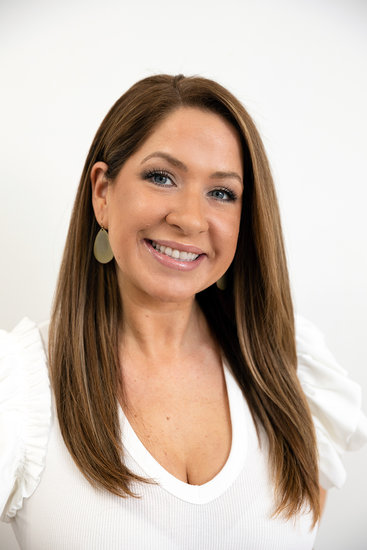
April McAllister, who grew up in Colonie, said she moved to Guilderland 13 years ago for the school system for her children.
“I want to bring a fresh perspective,” she said of why she’s running. “I’m not integrated in the school system. I’m just a mom. I am a local business owner, too.”
McAllister owns a hair salon and said, “I have the opportunity to hear from people raw. I hear the good, the bad, the indifferent.”
She decided to run with the Pro-parent Choice slate “so that we could help bring a fresh voice for all the people.”
McAllister said she doesn’t have a college degree, having learned her trade through the Capital Region BOCES program. She said new voices need to be heard, “not just the candidates on the board, but the people of the community.”
McAllister said, “I talk to a lot of people, a lot of parents, and people want to know a lot more of what’s going on out there …. Not all parents can make it to board meetings for their voice to be heard. They’re hard working for their families.” She wants to be a voice for those who haven’t been heard, McAllister said.
She also said, “I want to help bring back the basics of academics.”
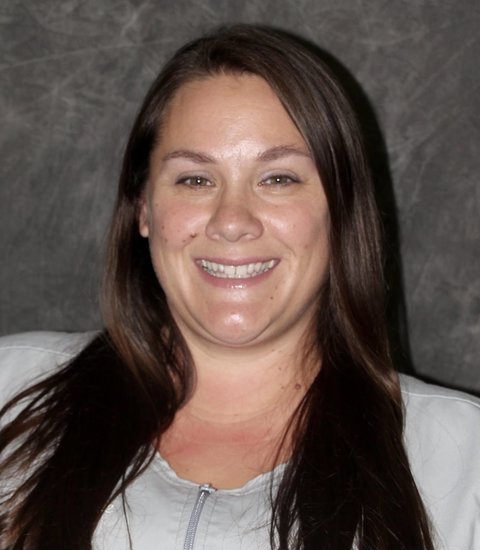
Nicole Coonradt described herself as a Berne-Knox-Westerlo graduate with an associate’s degree from Hudson Valley Community College. “I’m a good listener,” Coonradt said in McKownville. “I can easily facilitate compromise.”
Coonradt on March 4 wrote to the “Taking back our school boards” Facebook group, among a list of qualifications for her candidacy, “I am fiercely against mandates and I do not co-parent with the government or my children’s school.”
Coonradt told the Guilderland School Board on March 8 that sports are a necessity for her 12-year-old daughter who uses them as an outlet to curb her anxiety. Coonradt said that vaccination should be a choice for parents and children to make together with their doctor.
“I think it’s really, really important for parents to be a part of children’s education,” she said at the Enterprise forum. They’re more successful when their parents are invested, she said.
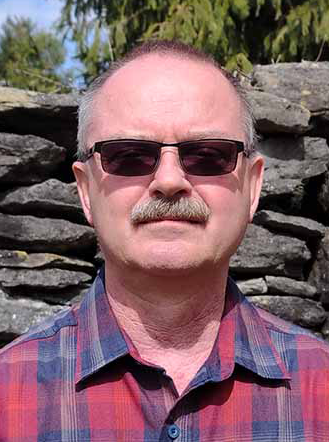
Mark Reamer, a lifelong resident of the school district, lives in Knox. Both of his children are Guilderland graduates.
He started out as a janitor in a restaurant chain and became an executive manager in charge of the food costs of 38 stores, Reamer said, before founding his own business; after 35 years, he is approaching retirement.
“My specialty is cost control,” he said. Reamer is running on the Pro-parent Choice slate.
If elected, he said, “My goal would be to bring some balance to the board. I’m just a regular guy. I’m not highly educated …. I believe we need to represent the parents and also to let them know what is going on in our schools. I am for fiscal responsibility.”
He also said Guilderland needs to improve its academic standing. “I am told we used to be in the top three or four,” he said. Reamer is for “fiscal responsibility” and said, “We need to represent the parents. And also let them know what is going on in our schools.”
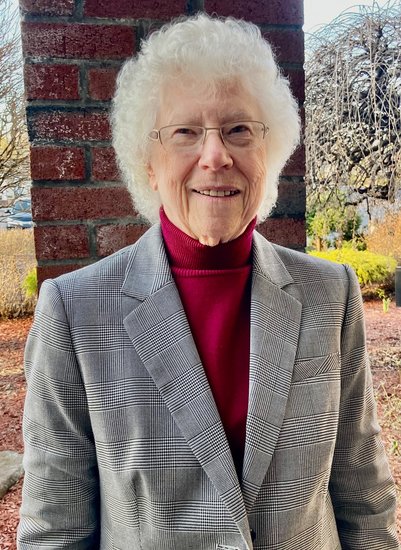
Barbara Fraterrigo is seeking a ninth term on the school board and has served for even longer on the Guilderland Public Library Board.
Raised in Massachusetts, she has bachelor’s degrees in chemistry and biology from Emmanuel College and has a passion for education and sports. She was a three-sport athlete in high school, she said, and coached when her now-grown children were younger. All five of her children are Guilderland graduates.
She said it’s important for the district to provide for every child, including music, arts, and sports, and she is proud of citizens supporting the budget. She wants today’s students to have the same opportunities her children did.
Fraterrigo, speaking in McKownville, said she was approached by the other candidates on the Pro-parents Choice slate “who felt parents should have a big voice.” Referring to ugly comments on social media, Fraterrigo said, “Hateful isn’t in my nature.”
She also spoke of the Olweus Bullying Prevention Program that she had backed as a board member years ago but said it had fallen by the wayside.
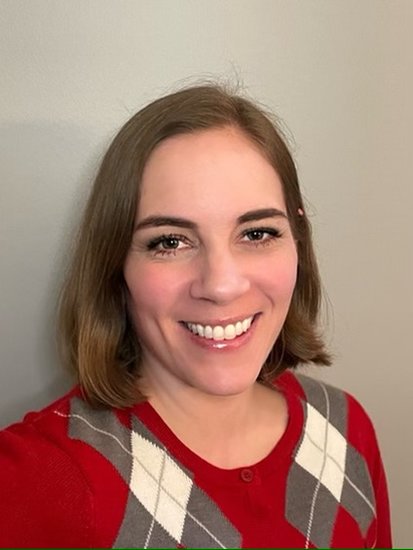
Jennifer Romano, running as an independent, said, “I’m running for school board because I want to ensure safer schools and embrace diversity, inclusion, and equity.” She has three children in the district.
She said she was the first non-district member on the district’s safety committee. Romano said she has a marketing and management degree from Siena College and a master’s of business administration from the University at Albany and has built a successful career in planning human resource systems solutions.
She raised thousands of dollars for the Westmere Elementary School playground to serve special-needs students, said Romano, and has also raised funds through a sneaker-recycling program. She described herself as “a natural out-of-the-box thinker, “ and said her priority is “safety first.”
Creative problem-solvers are needed to meet the immense challenges schools face in this pandemic era, Romano said.

William Kearney, running as an independent, has two sons at Pine Bush Elementary School and his wife is a teaching assistant at Farnsworth Middle School. He said he decided to run to bring a different perspective to the board.
Kearney is a certified public accountant with a master’s of business administration degree from the Dominican College of Blauvelt.
“I really feel that a fiscal mind is a good thing to have on any board, that looking at things for the numbers is always important,” he said.
If he were elected, Kearney said, he would be able to work well with the candidates running on the two slates. He said that “there’s a lot of groupthink” and that he would “listen to everyone’s opinions and give a different view than everyone’s used to.”
Kearney also said children’s education is central and other issues are ancillary.
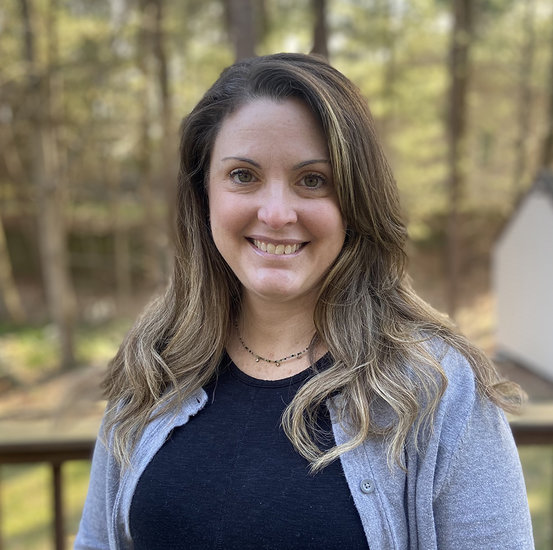
Kimberly Blasiak has four children in Guilderland schools, ranging from the elementary to high school levels. She was chosen among six applicants to fill a vacancy on the school board last October.
A native of Syracuse, she holds a bachelor of science degree in supply-chain management from Syracuse University.
She is active in the PTA locally and also on the board of directors for the New York State PTA. She is president of the board of directors for a not-for-profit that helps families through the court process when a child is sexually assaulted.
Blasiak, running on the slate with two other board members and a teacher, told the McKownville crowd that she genuinely believes in every child. “I pay attention. I love to research,” said Blasiak who describes herself as an advocate for special-needs students.
“We have a district full of students that need to feel safe ..,” she said. “We need to have a voice for every single child in our district.”
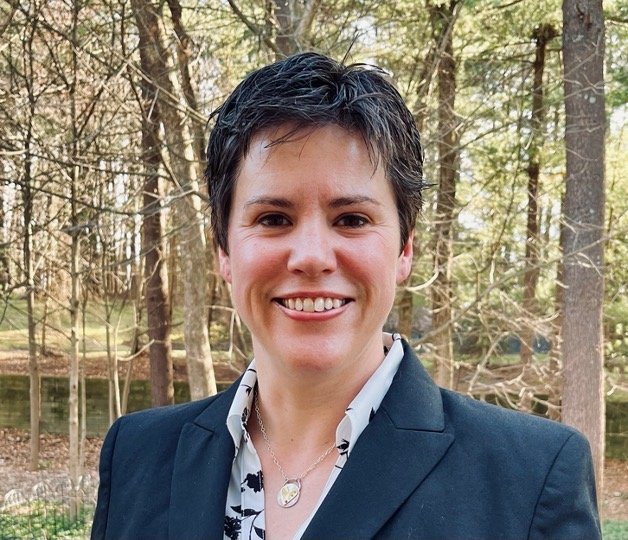
Kelly Person has served in the Air National Guard for 25 years and is currently an inspector general. She and her wife settled in Guilderland because her wife and her siblings all had great experiences in the Guilderland schools, Person said.
She earned a bachelor’s degree in sociology and a master’s degree in military operational art and science. She is running on the slate with two other board members and a teacher.
Person first ran for the board in 2019 because of her four children, she said. She thanked the teachers, administrators, and staff for dealing so well with the challenges of the pandemic.
“I want to continue making sure our schools are safe for our students moving forward ….,” Person said, adding, “Keeping kids in school is number-one paramount for me.”
Person, who serves on the board’s Diversity, Equity, and Inclusion Committee is passionate about the work the committee is doing.
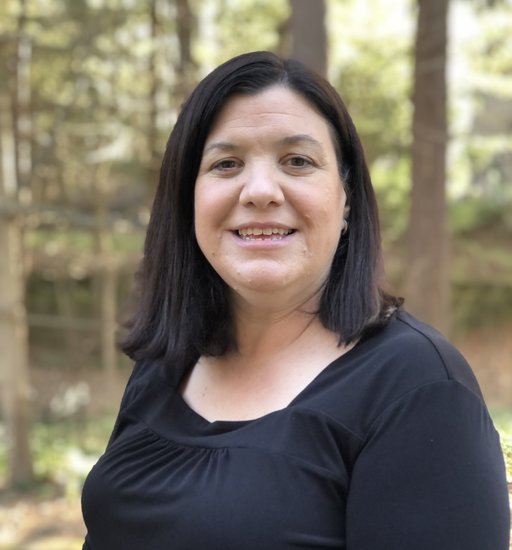
Katie DiPierro, a special-education teacher for Capital Region BOCES, has taught at both Lynnwood and Pine Bush elementary schools in Guilderland.
“We look to see what students need to be ready for the future,” she told the McKownville crowd, a philosophy that she wants to apply to every student in the district.
DiPierro has two children in the district and is running on a slate with three current board members.
She has been active in the PTA — having served two terms as vice president of the primary PTA and now is secretary at the high school PTA — and sees how parents along with teachers “can work together to make sure every student is successful,” she said.
DiPierro has recently been elected president of the Capital Region BOCES Faculty Association and looks forward to advocating for schools on the state level.
She enjoyed serving on a school building cabinet, working collaboratively with the teachers and administrators and parents.

Gloria Towle-Hilt, seeking her sixth term on the board, described an opening-day ceremony when she realized it was her 50th. She taught social studies at Farnsworth Middle School for 35 years and has been on the board for 15.
As she reflected on whether to run again, she got an answer from her reading. She quoted Martin Luther King Jr.: “Our lives begin to end the day we become silent on the things that matter.” Towle-Hilt went on, “And for me, school board matters.”
She is running on the slate with two other board members and a teacher, a slate which, she said, decided not to adopt a name.
Towle-Hilt’s two children have prospered because of their Guilderland education, she said. The mission of the district, she said, “has always been to provide every child with an education that will help them reach their full potential.”
She said the district focuses on the “whole child,” which includes the arts, physical education, and technical career skills as well as academics. “That’s what I’ve been committed to,” she said.
